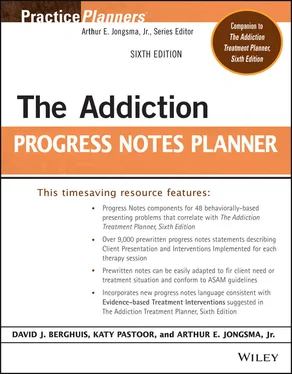The Addiction Progress Notes Planner
Здесь есть возможность читать онлайн «The Addiction Progress Notes Planner» — ознакомительный отрывок электронной книги совершенно бесплатно, а после прочтения отрывка купить полную версию. В некоторых случаях можно слушать аудио, скачать через торрент в формате fb2 и присутствует краткое содержание. Жанр: unrecognised, на английском языке. Описание произведения, (предисловие) а так же отзывы посетителей доступны на портале библиотеки ЛибКат.
- Название:The Addiction Progress Notes Planner
- Автор:
- Жанр:
- Год:неизвестен
- ISBN:нет данных
- Рейтинг книги:5 / 5. Голосов: 1
-
Избранное:Добавить в избранное
- Отзывы:
-
Ваша оценка:
- 100
- 1
- 2
- 3
- 4
- 5
The Addiction Progress Notes Planner: краткое содержание, описание и аннотация
Предлагаем к чтению аннотацию, описание, краткое содержание или предисловие (зависит от того, что написал сам автор книги «The Addiction Progress Notes Planner»). Если вы не нашли необходимую информацию о книге — напишите в комментариях, мы постараемся отыскать её.
The Addiction Progress Notes Planner, Sixth Edition
Addictions Treatment Planner, Sixth Edition
Addiction Treatment Planner, Sixth Edition
The Addiction Progress Notes Planner
The Addiction Progress Notes Planner — читать онлайн ознакомительный отрывок
Ниже представлен текст книги, разбитый по страницам. Система сохранения места последней прочитанной страницы, позволяет с удобством читать онлайн бесплатно книгу «The Addiction Progress Notes Planner», без необходимости каждый раз заново искать на чём Вы остановились. Поставьте закладку, и сможете в любой момент перейти на страницу, на которой закончили чтение.
Интервал:
Закладка:
9 Adolescent Criminal Activity (9)The client confirmed that their history of criminal activity and addiction began in adolescence.The client reported that they were often involved with juvenile justice officials or incarcerated within the juvenile justice system for illegal activities and substance abuse.The client acknowledged that substance abuse paralleled their antisocial behavior and dates back to adolescence.
10 Recklessness/Thrill Seeking (10)The client reported having engaged in reckless, adventure-seeking behavior and substance abuse, reflecting a high need for excitement, having fun, and living “on the edge.”The client described a series of reckless actions, often while under the influence of substances, which showed little consideration for the consequences of such actions.The client has begun to control reckless impulses and substance abuse and has reported trying to think of the consequences before acting recklessly.
11 Impulsivity (11)The client's pattern of impulsive behavior and substance use is demonstrated in frequent geographical moves, traveling with few or no goals, and quitting one job after another.The client's impulsivity has resulted in a life of instability and negative consequences for self and others.The client has acknowledged that their life of impulsive reactivity and substance abuse has had many negative consequences and that they are now committed to making an effort to control these impulses.The client has shown progress in controlling impulsive reactivity and substance misuse and now considers the possible consequences of actions before reacting.
INTERVENTIONS IMPLEMENTED *
1 Build Trust and Establish Rapport (1)Caring was conveyed to the client through support, warmth, and empathy.The client was provided with nonjudgmental support and a level of trust was developed.The client was urged to feel safe in expressing antisocial behavior symptoms.The client began to express feelings more freely as rapport and trust level have increased.The client has continued to experience difficulty being open and direct about the expression of painful feelings; the client was encouraged to use the safe haven of therapy to express these difficult issues.
2 Focus on Strengthening Therapeutic Relationship (2)The relationship with the client was strengthened using empirically supported factors.The relationship with client was strengthened through the implementation of a collaborative approach, agreement on goals, demonstration of empathy, verbalization of positive regard, and collection of client feedback.The client reacted positively to the relationship-strengthening measures taken.The client verbalized feeling supported and understood during therapy sessions.Despite attempts to strengthen the therapeutic relationship the client reports feeling distant and misunderstood.The client has indicated that sessions are not helpful and will be terminating therapy.
3 Identify Antisocial and Addictive Behavior as Self-Defeating (3)The client was asked to list the negative consequences that have accrued because of their antisocial behavior.The client was assigned the Step One exercise from The Alcoholism and Drug Abuse Client Workbook (Perkinson).The client was asked to identify others who have been negatively affected by their antisocial behavior and to list the specific pain that these individuals have suffered.The client was asked to verbalize an acceptance of the powerlessness and unmanageability they have over antisocial behavior and addiction.The client was confronted with the fear, disappointment, loss of trust, and loss of respect that others experience as a consequence of self-centered behavior and lack of sensitivity.The client denied any negative or self-defeating consequences because of their antisocial/addictive behavior and was provided with tentative examples of how this occurs.The client has not completed the assigned Step One homework and was redirected to do so.
4 Recognize Reciprocity of Antisocial and Addictive Behavior (4)The client was presented with the concept of a reciprocal relationship between antisocial behavior and addiction.The client was asked to identify how substances have played a part in their choices regarding antisocial behavior.The client was asked to verbalize how antisocial behavior has encouraged their addiction.The client denied any connection between antisocial and addictive behaviors and was urged to remain open to this concept.
5 Administer Antisocial Behavior Rating Scales (5)The client was administered psychological instruments designed to objectively assess baseline levels of antisocial behavior, impulsivity, and/or aggression.The client was administered the Psychopathy Checklist–Revised (PCL-R).The client was administered the Aggressive Acts Questionnaire (AAQ).The client was administered the Barratt Impulsiveness Scale-11 (BIS-11).The client was provided feedback regarding the results of the assessment of antisocial behavior, impulsivity, and/or aggression.The client declined to participate in taking the instruments used to assess antisocial behavior, impulsivity, and/or aggression and was redirected to do so.
6 Recognize Insanity (6)The client was presented with the concept of how doing the same things over and over again but expecting different results is irrational.The client was presented with the concept that irrational behavior (e.g., doing the same thing over and over and expecting different results) is what 12-step recovery programs call insanity.The client was asked to identify their experience of insane and irrational behavior and how this concept applies to them.The client rejected the concept of their behavior being insane or irrational and was provided with remedial feedback in this area.
7 Assess Level of Insight (7)The client's level of insight toward the presenting problems was assessed.The client was assessed in regard to the syntonic versus dystonic nature of their insight about the presenting problems.The client was noted to demonstrate good insight into the problematic nature of the behavior and symptoms.The client was noted to be in agreement with others' concerns and is motivated to work on change.The client was noted to be ambivalent regarding the problems described and is reluctant to address the issues as a concern.The client was noted to be resistant regarding acknowledgment of the problem areas, is not concerned about them, and has no motivation to make changes.
8 Assess for Correlated Disorders (8)The client was assessed for evidence of research-based correlated disorders.The client was assessed in regard to the level of vulnerability to suicide.The client was identified as having a comorbid disorder, and treatment was adjusted to account for these concerns.The client has been assessed for any correlated disorders, but none were found.
9 Assess for Culturally Based Confounding Issues (9)The client was assessed for age-related issues that could help to better understand their clinical presentation.The client was assessed for gender-related issues that could help to better understand their clinical presentation.The client was assessed for cultural syndromes, cultural idioms of distress, or culturally based perceived causes that could help to better understand their clinical presentation.Alternative factors have been identified as contributing to the client's currently defined “problem behavior” and these were taken into account in regard to their treatment.Culturally based factors that could help to account for the client's currently defined “problem behavior” were investigated, but no significant factors were identified.
10 Assess Severity of Impairment (10)The severity of the client's impairment was assessed to determine the appropriate level of care.The client was assessed in regard to impairment in social, relational, vocational, and occupational endeavors.It was reflected to the client that their impairment appears to create mild to moderate effects on the client's functioning.It was reflected to the client that their impairment appears to create severe to very severe effects on the client's functioning.The client was continuously assessed for the severity of impairment, as well as the efficacy and appropriateness of treatment.
Читать дальшеИнтервал:
Закладка:
Похожие книги на «The Addiction Progress Notes Planner»
Представляем Вашему вниманию похожие книги на «The Addiction Progress Notes Planner» списком для выбора. Мы отобрали схожую по названию и смыслу литературу в надежде предоставить читателям больше вариантов отыскать новые, интересные, ещё непрочитанные произведения.
Обсуждение, отзывы о книге «The Addiction Progress Notes Planner» и просто собственные мнения читателей. Оставьте ваши комментарии, напишите, что Вы думаете о произведении, его смысле или главных героях. Укажите что конкретно понравилось, а что нет, и почему Вы так считаете.












